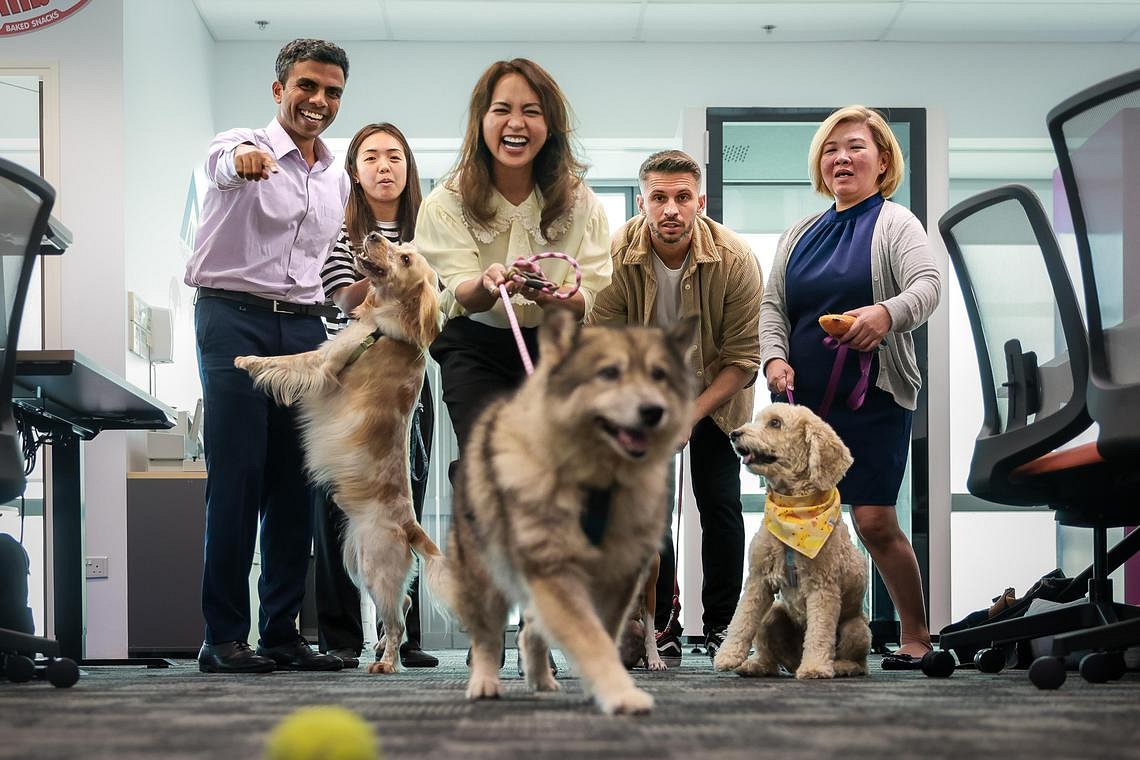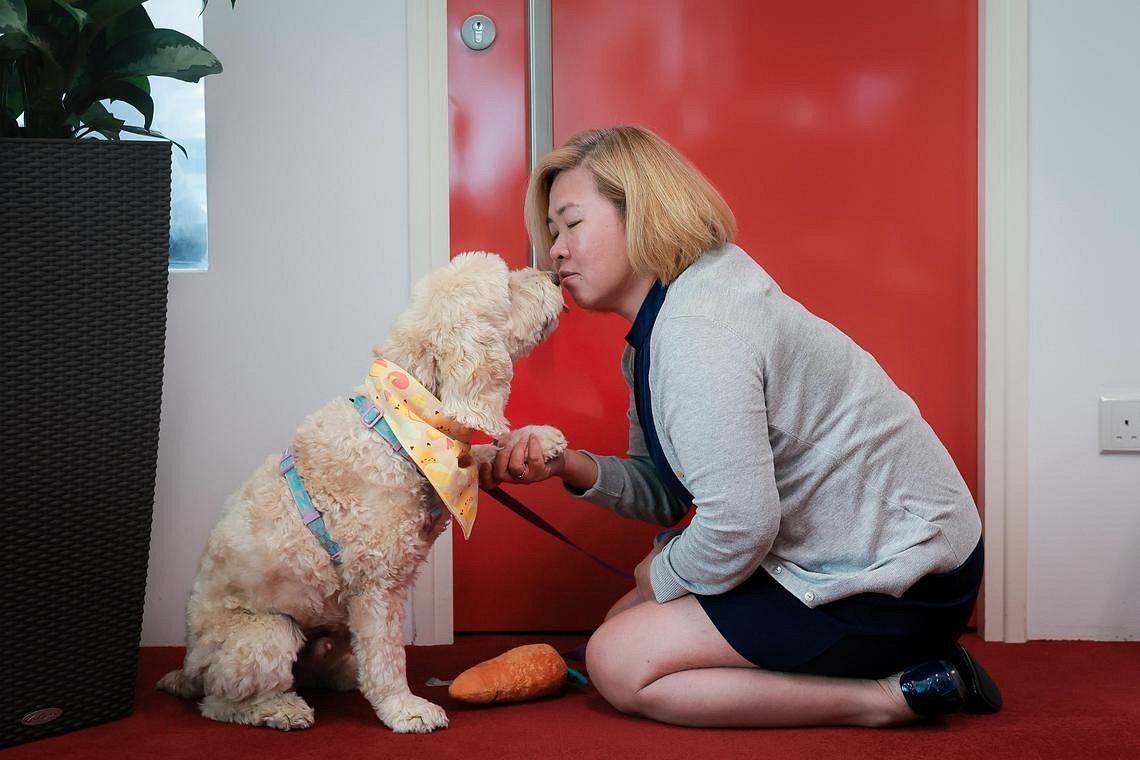Some bosses in Singapore let employees take pet care leave
When Ms Trisha Lim’s dog Tofu developed an underbelly infection in October 2024, she was relieved to be able to take her mixed breed chow chow-Japanese spitz to the vet without using her annual leave.
The 30-year-old public relations manager works at Brave Communications, one of a handful of local companies that offer pet care leave.
“My husband and I view Tofu as our child, and we are glad that there are bosses out there who are supportive and understanding about the stress and anxiety that pet owners go through,” she told The Straits Times.
Her boss Emilyn Ang, who founded the public relations and marketing agency in 2022, offers three days of “pawrental” leave a year so that her staff can tend to their sick pets. Employees can also take two days off for pet adoption and three days for bereavement. This is in addition to their family care leave.
Ms Ang, 44, said she recognised the importance of pet care leave after her own Chihuahua, Bandit, underwent hip surgery.
“I found it difficult to juggle both work and taking care of my dog, and decided that once I started becoming an employer, I would like to give my team the time and support they need to care for their sick pets,” said Ms Ang, who formalised the benefits in her five employees’ contracts in 2024.
Currently, the leave covers those with dogs and cats, but if her future employees have other types of pets, she will consider extending the benefit to them as well.
“The definition of family has evolved, and many people consider pets to be family members. As employers, we should adapt and know what drives our employees to be physically and mentally healthier,” she said.
Still a rare perk
Pet care leave remains a rare perk in Singapore’s corporate scene, based on ST’s checks with some 30 companies, including a mix of small agencies and multinational corporations.
“The concept of offering pet care leave is a relatively new one, but we do see it as one of the evolving benefits in a company’s talent hiring and retention strategies,” said Mr Monty Sujanani, country manager of recruitment firm Robert Walters Singapore.
“We see more companies exploring this (concept), but are not necessarily implementing it yet,” he added.
Some early adopters include global advertising agency TBWA. Ms Mandy Goh, TBWA Singapore’s head of Talent and Human Resource, told ST that since 2019, its employees in the local office are entitled to two days of family care leave, which can be used for pet care.
Noting that what qualifies as a pet varies from person to person, Ms Goh said the agency encourages open discussion between its employees and their managers.
Digital publisher Mothership also extended its family care leave to include pets in 2024.
American multinational Mars, which has 56 employees in its Singapore office, has jumped on board since Jan 1.
The global confectionery and pet food manufacturer first offered pet care leave to its staff in Japan and Europe. Starting this year, its employees in South-east Asia will also get one day of paid leave for pet adoption or bereavement, said Ms Anastasia Timoshina, a corporate affairs director at Mars Pet Nutrition.
Mars wants to be a company that walks the talk, she said, adding that “as a company that is pet and pet parents obsessed, we want to acknowledge that the welcome and goodbye of pets are important to us”. She added that the company also allows its staff to come to work with their pets so they can spend more time together.

To guard against abuses, Ms Timoshina said employees have to seek their managers’ approval first before applying for pet care leave in the company’s system.
Ms Kirsty Tay, an office administrator for Mars Pet Nutrition in the Singapore office, said she appreciated the new perk.
When her previous dog died of cancer in the middle of the night years ago, she reported to work the next morning despite needing time to grieve. It was hard for her to ask her ex-employer for urgent leave “as not everyone is a pet owner and they may not understand that a dog is also our family member”, said Ms Tay, who now owns Alphie, a cockapoo.

Pet ownership on the rise
Singapore has seen a steady rise in pet ownership over the years.
The Animal and Veterinary Service (AVS) said the number of licensed dogs in Singapore has gone up by 30 per cent since 2019. There are now about 91,000 licensed dogs here.
The pet cat population hovered around 94,000 in 2024, a jump of almost 10 per cent from 2019, according to a Euromonitor International report.
In addition, the number of licenced pet shops here has increased from 267 in 2019 to 362 in 2022, before falling slightly to 345 in 2024, said Ms Jessica Kwok, AVS’ group director of regulatory and industry standards.
Many pawrents are increasingly willing to spend big on their pets, from throwing them the best party to arranging end-of-life care for them.
Given the trend, offering pet care leave can help companies attract and retain more talent, said Mr Sujanani from Robert Walters.
“As pets are known to provide emotional support, benefits such as pet care leave can help promote the importance of mental health and well-being too,” he added.
But he cautioned that implementing pet care leave can be complex. Companies have to define what qualifies as pet care, make sure that productivity is not affected, and keep in mind the equity issue as employees without pets may feel excluded, he said.
Although most companies do not offer pet care leave, some provide flexibility for employees to tend to their pets when the need arises.
Google Singapore said its employees can work with their managers to arrange a vacation, unpaid time off or a temporary flexible working schedule if they lose a pet or an animal companion.
A Google employee who wanted to be known as Mr Ong said he does not expect the company to grant full childcare benefits to pawrents like him, but he would appreciate having some time off to care for his cats when they are ill.
For pawrents like Ms Sheryl Tan, who owns a dog and a duck, her wish is for her company to rename its existing parent care leave to the broader family care leave, which she can use to attend to her parents, children or pets.
“This is so that no one will feel left out,” said the 34-year-old marketing manager.
Get The New Paper on your phone with the free TNP app. Download from the Apple App Store or Google Play Store now

